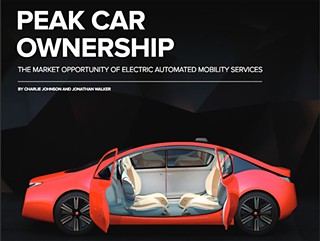Public Notice: November at Last
Yesterday was the Day of the Dead, and next week, our long, long national nightmare will come to a close (unless another one is about to begin, but I just can’t contemplate that)
By Nick Barbaro, Fri., Nov. 4, 2016
Yesterday was the Day of the Dead, and next week, our long, long national nightmare will come to a close (unless another one is about to begin, but I just can't contemplate that). Before I let you get on with your lives, though, here's one more wild card to contemplate if you're still trying to figure out what to think about the Proposition 1 mobility bond: "Peak Car Ownership."
Most of the discussion about the city mobility bond has circled around the issue of whether the plan and funding will actually make driving easier on the targeted roads. Is there too much funding for alternative modes of transportation? Or not enough? Does it get buses moving faster, and out of the way of the cars that clog the roads, or just take away vehicle travel lanes that will make the driving experience worse? Can a $720 million investment even slow down our steady slide into gridlock, let alone improve it? Those are the sorts of questions voters are asking themselves, and despite a lot of vehemence on both sides, there's a lot of uncertainty out in voterland.
But here's a question no one is asking: What if, by the time any of these plans begins to turn into action, there are significantly fewer drivers on the road, rather than more? And what if that trend line is permanent?
The Rocky Mountain Institute, one of the smarter futurist think tanks out there, and a key partner in the city's transportation strategy, recently released what it calls the "Peak Car Ownership Report," which concludes that "peak car ownership in the United States will occur around 2020 and will drop quickly after that," as autonomous shared vehicles begin to take over market share. That's no pipe dream: Every major U.S. automaker has already announced plans to bring autonomous cars to market as soon as 2018, and RMI makes a pretty convincing argument – based on the economics, and the pace at which transformative technologies get adopted – that "automated mobility services could capture two-thirds of the entire U.S. mobility market in 15-20 years." And they will likely constitute a sizable amount of the traffic in selected markets before 2024 – even as the Prop 1 projects are being built. Nor is this really a new idea; Uber and others have been saying for years that if you take the drivers out of the equation, the cost per mile becomes so low that car ownership makes little sense anymore, except as a luxury.
Of course, there's a lot of work to get from here to there – mapping, safety testing, regulation guidelines, infrastructure build-out, and more – and that's where the "selected markets" come into play. RMI envisions at least three stages of early-adopting markets in the U.S., and lists Austin as one of five "likely launch markets." (See the RMI Peak Car Ownership Report at www.rmi.org.)
Coincidentally (or not), Bloomberg Philanthropies and the Aspen Institute announced this week that they've asked Mayor Steve Adler to join an "Initiative on Cities and Autonomous Vehicles" – "the first global initiative for leading cities to work together to prepare for the emergence of autonomous vehicles. The program will tap experts across a wide range of practice areas and concerns, from technologists and urban planners to experts in the areas of inequality and mobility," and the inaugural cities will be Austin, Los Angeles, Nashville, Paris, and Buenos Aires.
So what does all this have to do with Prop 1? Beats me. That's for you to figure out.
Meanwhile, for another perspective on how slowly conditions improve (or perhaps on how quickly they can change while you're not noticing), let me highly recommend a truly remarkable photo exhibit: "Mississippi 1996: Riding With John," a collection of images and text by iconic Texas photographer Wyatt McSpadden, documenting a trip with dearly departed writer John Morthland, exploring the Country Blues scene across mostly rural, mostly black Mississippi, visiting "musicians, folk artists, juke joints, catfish parlors, junk shops, and record stores." As black-and-white portraiture it's exquisite; as a document of a culture delicately poised in time between 1866 and 2016, it's even better. And if you knew John at all, you must go. Up through Nov. 10 at the Gallery at Lewis Carnegie, 1312-B E. Cesar Chavez (entrance through the back gate on Navasota), 9:30am-5:30pm weekdays and 10am-4pm Saturdays. McSpadden will be there on Sat., Nov. 5, to discuss the work and field questions.
Got something to say on the subject? Send a letter to the editor.











